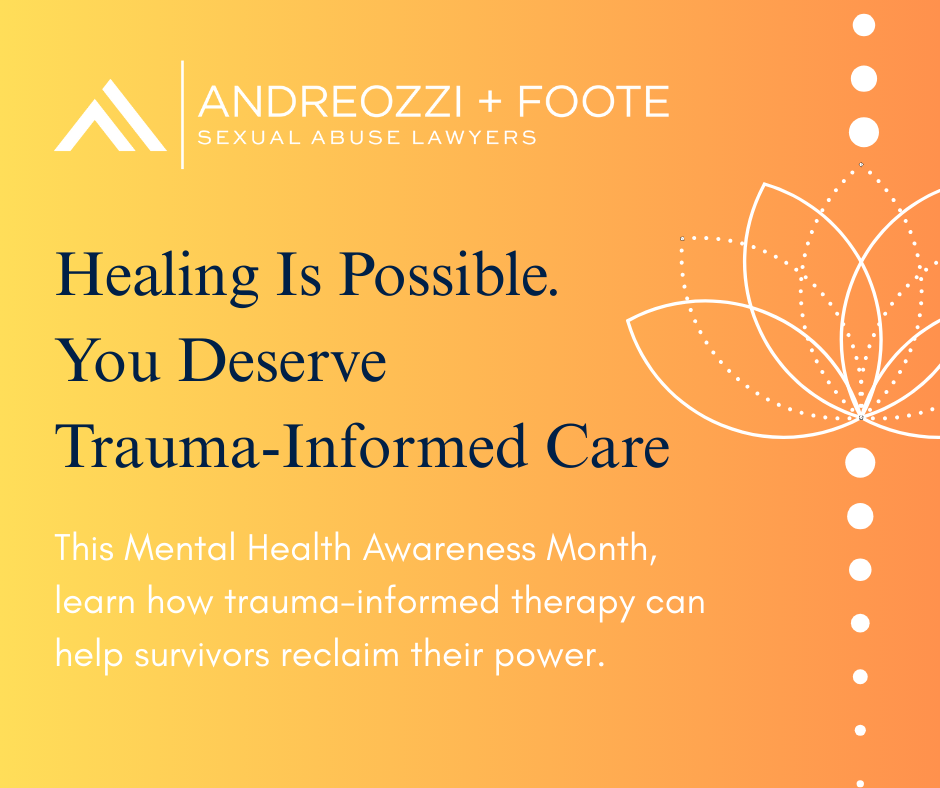May marks Mental Health Awareness Month—a time to break the silence, amplify voices, and center the healing journeys of survivors. For those of us who have endured the life-altering impact of sexual abuse, the path toward healing can feel overwhelming and isolating. But I am here to tell you: healing is not only possible—it’s your right.
As a survivor, author, and advocate, I’ve lived the pain of trauma and walked through the long, winding road of recovery. I’ve experienced firsthand the power of trauma-informed therapy—therapies that don’t retraumatize, but instead empower. And I want every survivor to know: you deserve support that sees you, hears you, and believes you.
Why Trauma-Informed Therapy Matters for Survivors
Sexual abuse fundamentally alters our nervous systems, our relationships, our self-worth. Traditional mental health approaches often fall short when they don’t acknowledge the deep, embodied nature of trauma. That’s where trauma-informed care steps in.
Trauma-informed therapy isn’t a type of therapy—it’s a lens. It’s a way of seeing the survivor first, understanding how trauma impacts the brain and body, and avoiding any treatment approach that may cause harm or retraumatization.
Here’s what trauma-informed therapy does:
- Recognizes the impact of trauma on every aspect of a person’s life—mental, emotional, physical, and spiritual.
- Prioritizes safety—both physical and emotional.
- Centers empowerment and choice—allowing survivors to reclaim autonomy.
- Builds trust through transparent, respectful communication.
- Acknowledges and validates the survivor’s experience—without judgment.
Types of Trauma-Informed Therapies That Support Healing
Survivors often need a multifaceted approach to heal. No one therapy works for everyone, but here are evidence-based, trauma-informed therapies that have proven to be powerful for survivors of sexual abuse:
1. Eye Movement Desensitization and Reprocessing (EMDR)
- Designed to help the brain process and release traumatic memories.
- Particularly helpful for survivors with PTSD and flashbacks.
- Often feels less invasive than traditional talk therapy.
2. Somatic Experiencing
- Focuses on the body’s response to trauma, helping you feel safe in your body again.
- Emphasizes grounding and nervous system regulation.
3. Internal Family Systems (IFS)
- Helps survivors understand the parts of themselves that were created to protect them.
- Encourages self-compassion and integration.
4. Cognitive Processing Therapy (CPT)
- Addresses distorted beliefs around the trauma (guilt, shame, self-blame).
- Helps reframe narratives that keep survivors stuck.
5. Narrative Therapy
- Empowers survivors to tell their story and reclaim their voice.
- Reinforces that the trauma does not define who they are.
6. Group Therapy with a Trauma-Informed Facilitator
- Fosters connection with others who have walked similar paths.
- Validates that you’re not alone and provides strength in shared experience.
What to Look for in a Trusted Trauma Therapist
Finding the right therapist is critical—and you have every right to ask questions, advocate for your needs, and walk away from anything that doesn’t feel safe. Here’s what to look for:
- Trauma-specific training: Ask if they have experience treating sexual abuse survivors and what modalities they use (EMDR, IFS, etc.).
- Licensure and certifications: Confirm they are licensed in your state and accredited by professional bodies.
- Survivor-centered language: Listen for words of validation, safety, and empowerment—not judgment or clinical detachment.
- Commitment to cultural humility: Do they understand and respect your lived experience, identity, and background?
- Collaborative approach: Do they invite your voice into the room? A good therapist partners with you, not overyou.
Where to Find a Trauma-Informed Therapist
Searching for a therapist can be daunting, especially when you’re in pain. But you’re not alone. Start with these trusted resources:
- PsychologyToday.com: Use filters to find trauma-informed and sexual abuse specialists in your area.
- RAINN (Rape, Abuse & Incest National Network): Offers a directory of support services and crisis resources.
- The National Child Traumatic Stress Network: Lists trauma centers with experienced providers.
- TherapyDen.com: An inclusive therapist directory focused on marginalized identities and trauma work.
- Your local rape crisis center or victim services agency—they often have strong referral networks and may offer therapy on a sliding scale.
Final Words: Your Healing Is Sacred
I know how lonely it can feel to carry trauma. But I promise you—there is a path forward. Trauma-informed therapy offers more than just treatment. It offers a chance to rebuild trust. To feel safe. To reclaim your voice and your power.
This Mental Health Awareness Month, let’s shine a light on the very real struggles survivors face—but let’s also shine a light on the strength it takes to heal.
And if no one has told you lately:
You are worthy.
You are believed.
And you are not alone.
If you are a survivor of sexual abuse and ready to take the next step in your healing, know that civil justice may also be part of your path. Contact Andreozzi + Foote for a confidential consultation. We are here to help you reclaim your power.


